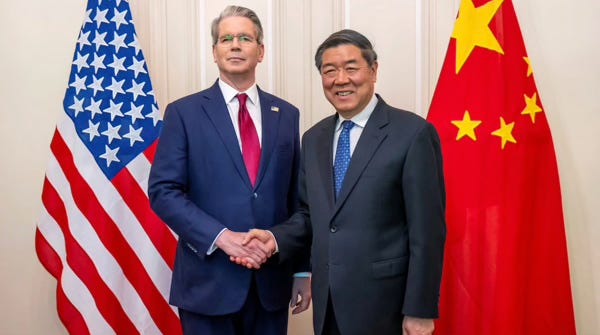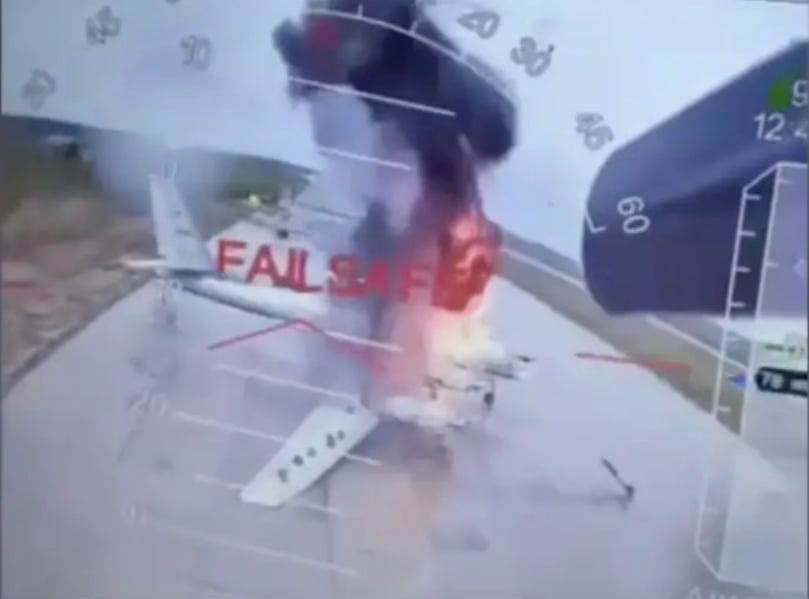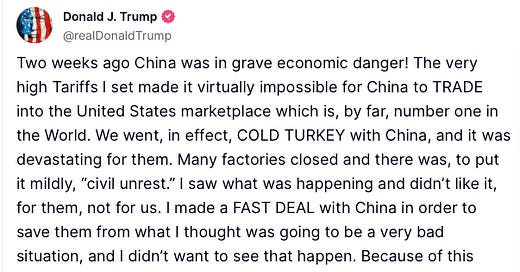U.S.-China Tariff Truce Frays Amid Accusations
Ukraine shocks war planners in Russia, NATO with drone strikes on Tupolev strategic bombers.
Trade tensions appear to be rising again between the US and China just weeks after a 90-day tariff truce was declared by representatives of the two nations with the world’s largest economies.
Beijing’s Ministry of Commerce accused the US’s Trump administration on Monday of ‘severely violating’ the terms of a deal struck in mid-May in negotiations in Geneva.
In a statement released June 2, China’s Ministry of Commerce said new US export controls on AI chips, a halt to sales of chip design software, and announcement of visa revocations for Chinese students have ‘seriously undermined’ the Geneva agreement.
‘If the US side insists on going the wrong way and continues to harm China's interests, China will resolutely take forceful measures to safeguard its legitimate rights and interests,’ the Commerce Ministry said.
Earlier, President Trump claimed in a social media post on May 30 that China had ‘TOTALLY VIOLATED’ the truce, though he offered no details. US Trade Representative Jamieson Greer later said Beijing had had slow-walked approvals of critical minerals export licenses.
In two days of talks in Geneva, US Treasury Secretary Scott Bessent and Chinese Vice Premier He Lifeng had agreed to a 90-day suspension of most tariffs imposed by both sides since Trump escalated a tariff war in April.
‘Fresh hostilities between the US and China show that the many questions left hanging after the Geneva ceasefire still have no satisfactory answers,’ Arthur Kroeber of Gavekal Research said in a 2 June note to clients titled ‘Back To The Brink’.
‘It is not clear whether US trade policy is being run by President Trump, his trade negotiators, or his national security team,’ Kroeber said.
‘On China specifically, Trump’s team either has a bad strategy or no strategy at all, and continues to underestimate both China’s leverage and its willingness to walk away from talks that deliver it no concrete benefit.’

Vice Premier He has a clear mandate from President Xi Jinping to play hardball with Trump’s team, the Wall Street Journal reported on 2 June, citing unnamed ‘people who consult with senior Chinese officials’.
‘Strategically, Xi feels empowered to harden his position from Trump’s first term. The arsenal of trade tools China has built under He’s leadership, including export controls of critical materials used to make chips, cars and F-35 jets, gives it the ability to cause the US real pain,’ the WSJ said.
‘China has also narrowed the technological gap with the West, racing ahead in many strategic sectors such as renewable-energy products, robotics and artificial intelligence. Such progress makes the country less vulnerable to US sanctions than in the past.’
Ukraine Strikes Russian Strategic Bombers
In a surprise drone attack, Ukraine struck a major blow to Moscow’s long-range, strategic bomber fleet on 1 June, damaging or destroying as many as 20 aircraft, according to US officials, including six Tu-95 and four Tu-22M bombers, and an A-50 airborne command-and-control plane.
The strategic bombers are used by Russia for missile strikes on Ukraine as well as for strategic nuclear deterrence.
The audacious drone attack deep inside Russian territory, dubbed operation ‘Spider’s Web’, was planned and executed by Ukraine’s covert operations service, the SBU. Dozens of inexpensive drones reportedly were smuggled into Russia in shipping containers on trucks. The drones then were remotely activated and launched against four Russian air bases, including Belaya Air Base in Siberia, more than 3,000 miles from Kyiv.
Ukraine claimed more than 40 of Russia’s roughly 100 aging Tupolev strategic bombers were hit. The Tupolev are no longer in production and cannot easily be replaced.

The scale and reach of the attack shocked Russian, US and NATO military planners and bolstered Ukrainian morale at a time when the country faces mounting pressure from Washington to negotiate with Moscow.
Ukraine ‘has now taken warfare to the next level,” Evelyn Farkas, a former US deputy assistant secretary of defense for Russia, Ukraine and Eurasia, told The New York Times.
‘They are showing that you can now coordinate drones in order to achieve strategic effect,’ Farkas, executive director of the McCain Institute, said.
The vulnerability of the bombers had been a point of criticism among Russian military bloggers, Samuel Bendett, a drone expert and adviser to the Russia studies program at the Center for Naval Analyses, told The Washington Post.
American officials said they expected that Russia would mount a significant retaliation against Ukraine for the strikes, according to reporting by The New York Times.
‘US intelligence has not, so far, identified what Russia is likely to strike, but officials believe Moscow could renew drone strikes on civilian targets, hit the energy grid or launch new waves of intermediate-range ballistic missiles,’ the Times said.
Talks in Istanbul
Russian and Ukrainian negotiators met for just over an hour in Istanbul on 2 June, their second direct meeting. They agreed to an exchange of prisoners and dead soldiers but no progress was made toward a ceasefire. Hopes for a broader political resolution to the war remain dim.
Russian President Vladimir Putin is stalling at the peace table while preparing a new military offensive in Ukraine, two US senators warned in remarks to media in Paris on 1 June.
Senator Lindsey Graham, a Republican, and Senator. Richard Blumenthal, a Republican, met earlier with President Volodymyr Zelenskyy in Kyiv and were shown evidence Putin is preparing a new offensive.
‘What I learned on this trip was he’s preparing for more war,’ Graham said, according to The Associated Press. ‘It’s become painfully clear he’s not interested in ending this war.’
The US Senate is preparing draconian sanctions legislation that would hit China, India and other countries seen aiding Russia’s war effort through trade in oil and gas, and dual-use technologies.




